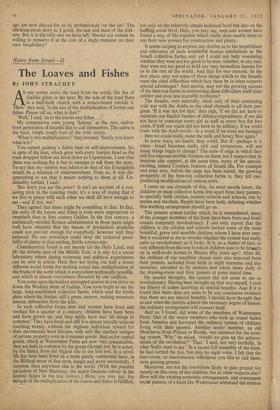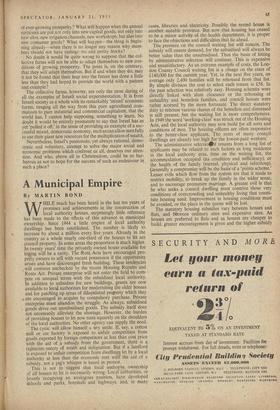Notes from Israel-11
The Loaves and Fishes
By JOHN STRACHEY AS one conies down the road froth the north, the Sea of Galilee glints in the heat. By the side of the road there is a half-built church with a notice-board outside it. `Here,' they said, 'is the site of the multiplication of loaves and fishes. Please tell us, what is that?'
My companions were young `Sabras,' as the new, native- born generation of Israelis like to call themselves. The sabra is the hard, rough, tough fruit of the wild cactus.
'What is this multiplication?' they insisted. 'Surely you know what it is?'
You cannot gainsay a Sabra bent on self-improvement. So, in spite of the heat, which grew with every hairpin bend as the road dropped below sea level down to Capernaum, I saw that there was nothing for it but to attempt to tell them the story. To say that my version was inferior, to that of the Evangelists would be a triumph of understatement. Even so, it was dis- appointing to see that it meant nothing to them at all. Un- deniably nettled, I said : 'But don't you see the point? It isn't an account of a con- juring trick in the catering trade; it's a way of saying that if we live in peace with each other we shall all have enough to eat—and if not, not.'
They 'agreed that there might be something in that. In fact, the story of the loaves and fishes is even more appropriate to twentieth than to first century Galilee. In the first century, a statistically-minded Roman administrator in those parts might well have objected that the means of production available could not provide enough for everybody, however well they behaved. No one nowadays could deny the technical possi- bility of plenty in that smiling, fertile countryside.
Contemporary Israel is not merely (a) the Holy Land, and (b) the trouble spot of the Middle East; it is also (c) a social laboratory where daring economic and political experiments can be seen in action. Here they are trying out half a dozen different social forms for making actual that multiplication of the fruits of the earth which is everywhere technically possible, and which is almost everywhere thwarted by our conflicts. not only on the relatively simple technical level but also on the baffling social level. Here, you may say, men and women have found a way of life together which really does enable them to use their new powers for construction and plenty.
It-seems carping to express any doubts as to the hopefulness and relevance of such wonderful human institutions as the Israeli collective farms, and yet I could not help wondering whether they were not too good to be true; whether, at any rate, they were not too good to hold any very immediate lessons for us in the rest of the world. And that for two reasons. In the first place, may not some of those things which to the Israelis seem the chief difficulties which face them be in other respects special advantages? And second, may not the growing success of the best-run farms in overcoming these difficulties itself raise subtler and even less tractable problems?
The Israelis, very naturally, think only of their continuing cold war with the Arabs as the chief obstacle to all their pro- gress. 'If it was not for that,' they sigh, 'if we did not have to maintain our fearful burden of defence expenditure; if we did not have to conscript every girl as well as every boy for two years, if half our roads did not have to be military, if we could trade with the Arab world—in a word, if we were not besieged —then we could really make the milk and honey flow again.'
In some ways, no doubt, they could. But if—perhaps it is when—Israel becomes really rich and prosperous, will not many things begin to change? The state of siege in which they still live imposes terrible burdens on them; but I suspect that its tensions also support, at the same time, many of the special. exciting, indeed Utopian, features of Israeli life. For example and even now, before the siege has been raised, the growing prosperity of the best-run collective farms is, they tell one, producing modifications of various sorts.
I came on one example of this. As most people know, the children on most collective farms live apart from their parents, in specially built creches, nursery-schools and schools, run by nurses and teachers. People have been hotly debating whether this startling arrangement should go on.
The present system (under which, be it remembered, many of the younger members of the farm have been born and bred) sounds extremely revolutionary. I can only report that the children in the crèches and schools looked some of the most beautiful, grave and sensible children whom I have ever seen. But it occurred to me to wonder whether the system was really quite so revolutionary as it looks. Is it, as a matter of fact, so very different from the way in which children used to be brosight up in well-to-do homes in Britain fifty years ago? After all, the children of our wealthier classes were also removed from their parents, secluded from birth in night nurseries and day nurseries, attended to by nannies and taken down daily to the drawing-room and their parents at some stated time.
On second thoughts, the system did not seem to me so revolutionary. Having been brought up that way myself, I took the liberty of rather doubting its special benefits. And if it is found that there does not seem to be any conclusive evidence that there are any special benefits, I should have thought that as and when the parents achieve the necessary degree of leisure, the ordinary arrangement will reassert itself.
And so, I found, did some of the members of Watersmeet Farm. One of the senior members who took us round hailed from America and favoured the ordinary system of children living with their parents. Another senior member, an old Menchevic from Poland or Russia, was adamant for the exist- ing system. 'Why,' he asked, 'should we give up the achieve- ments of the revolution?' That; I said, not very tactfully, 'is what Stalin used to say.' In a recent full assembly of the farm, he had carried the day, but only by eight votes. I felt that the innovators, or reactionaries, whichever you like to call them, were gaining ground. of ever-growing prosperity? What will happen when the annual surpluses are put not only into new capital goods, not only into new silos. npw irrigation channels, new workshops, but also into new consumer goods? What will happen—the thing is begin- ning already—when there is no longer any reason why mem- bers should not have radiogr ms and pretty frocks?
No doubt it would be quite wrong to suppose that the col- lective farms will not be able to adapt themselves to new con- ditions of growing prosperity. The point is, on the contrary, that they will adapt themselves. But if and when they do, may it not be found that their leap into the future has done a little less than they had hoped to provide the world with a pattern and example?
The collective farms, however, are only the most daring of all the examples of Israeli social experimentation. It is from Israeli society as a whole with its remarkably `mixed' economic forms, ranging all the way from this pure agricultural com- munism to pure industrial and commercial capitalism, that the world has, I cannot help supposing, something to learn. No doubt it would be entirely premature to say that Israel has as yet `pulled it off,' in the sense of providing an example of a suc- cessful mixed, democratic economy, such as can allow men fully to use their giant new resources for the multiplication of wealth. Nevertheless, Israel's passionate, yet always rational, demo- cratic and voluntary, attempt to solve the major social and economic problems which confront us all, deserves our atten- tion. And who, above all in Christendom, could be so bar- barous as not to hope for the success of such an endeavour in such a place?



































 Previous page
Previous page